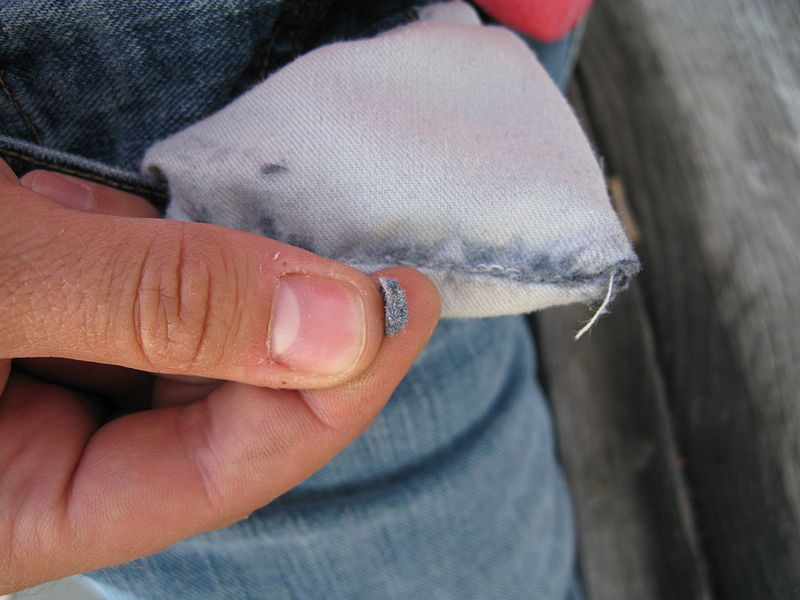
This isn't the subject of today's post. This is a guy with the same name, who got nailed on weapons charges and whom the good folks at BustedMugshots.com went to the trouble of photographing.
…In which we’re so incensed by a news story that someone else wrote, we have no choice but to comment on it.
Most financial truths are obvious: spend less than you earn, don’t waste your money, note where it’s going, economize where you can, et al. Those truths are so obvious that we barely mention them on this site. Let the other, less imaginative sites handle that.
We’re more interested in unconventional, even iconoclastic truths. There’s one that comes up time and again, that’s so important we’re thinking of putting it right up there with our mantra, Buy Assets, Sell Liabilities.
On balance, higher education doesn’t pay off.
You don’t need our declaration to make it official. Think about your own life and those of those who surround you. The English literature graduate pouring coffee. The M.A. in philosophy who’s making $30,000 as a research assistant. The criminal justice major who can’t make ends meet selling real estate, which doesn’t even require a university education.
Most worthwhile jobs don’t. Some do, of course. But for every research physicist or medical dosimetrist who spent good money studying the hard sciences, there are multiple people who spent comparable money studying something less challenging and with less demand in the marketplace.
Oh, here we go again. Don’t you understand that education has an importance beyond dollars and cents?
Okay, then why isn’t it free?
It’s free in Australia.
No, it’s funded by taxpayers in Australia. Let’s rephrase the question: Why don’t college professors work pro bono, if it’s only about enriching young minds?
For the latest example of someone putting his faith in the wrong place, meet the grossly overeducated Andrew Slocum. He’s a junior high school librarian. Last year, at the age of 36, the married father of a 4-year-old spent $10,000 on an “advanced teaching certificate”. Whatever its other merits, this piece of paper qualified him for an annual $3000 raise; in the same way that having a penis qualifies him to be an Army Ranger. The certificate didn’t guarantee him anything.
An advanced teaching certificate is not to be confused with, say, a bachelor’s degree in corporate finance. The latter is a requisite for a career that the degreeholder wouldn’t otherwise be able to enter. The former allowed Mr. Slocum to do the same job he always did, with a possible salary increase simply for holding the piece of paper itself. The certificate had, and has, zero intrinsic value.
Unless you count the $10,000 it cost.
(Without the increase Mr. Slocum was hoping for), he reckons his family would be losing $60,000 over the course of their careers.
Only in academia can a $10,000 investment pay -6 times itself and still have people defending it.
Mr. Slocum has spent his entire adult life in schools, which is of course where he spent his entire pre-adult life. Education for its own sake is the ultimate comfort zone. “I’ve endured 16 years in a classroom. Now that I can go anywhere I want, I think I’ll…spend my life in a classroom.” Mr. Slocum had it out at a school board meeting.
He talked of his sacrifices: vacations, hard-earned cash and perhaps the most valuable — time with family and friends.
Oh, you whiny little princess.
Another fundamental truth: life, especially your financial life, is about results, not effort. Who’s a bigger net contributor: the guy who spends 80 hours a week digging postholes in the hot sun and then filling them up, or the woman who spends 4 seconds unlocking the doors to Target every morning so people can buy what they need?
All of it was for naught, Slocum said. Although he received his education raise this school year per the district contract, Slocum said he’s been wary about spending any of it. Instead, he’s been saving it, just in case he’d have to give it back.
Slocum is still saddled with $25,000 in student loan debt from his undergraduate and master’s degrees.
You really can’t make this stuff up. Multiply Mr. Slocum’s case by tens of millions, and you’ll have a better idea of where North American society is headed.
He earned the undergraduate and master’s degrees more than a decade ago, and is still carrying a balance equal to 5 months’ salary. 5 years ago, he decided to reproduce, because having a child you can’t afford is a great way to get back on track.
Again, poor and struggling people are poor largely because they choose to be. Mortgaging your future to cough up $10,000 for an enhancement in your education that might pay off is a retarded bet. Especially when you’ve already flushed $25,000+ down an education hole that’s got you in the position where you are today.
Somewhere within a couple blocks of Mr. Slocum’s house is a long-haul truck driver who makes comparable money and doesn’t have that educational albatross around his neck. One (more expensive) neighborhood over is a low-voltage electrician who tangibly improves people’s lives, and who instead of spending $10,000 on a useless certificate, spent it on a down payment for a second house. Which he now rents out for more than the mortgage payment, uses as a tax deduction, and passively finances his vacations with.
Mrs. Slocum, a $38,652-a-year teacher, encapsulates her family’s dilemma far better than we could:
“(The school board is) basically penalizing us for pursuing higher education. What kind of message does that send to the kids?”
Oh, that’s a rhetorical question? We answered it above. In bold.
“This is the first time I’ve felt embarrassed to be a teacher because I have to beg for the salary I deserve,” (Mr. Slocum) said, addressing School Board members.
News flash: whether you’re a butcher, drilling rig supervisor, baker, librarian, or candlestick maker, you don’t deserve a damn thing. A smart person would know that. An educated person wouldn’t necessarily.
Coda: The story mentions that to secure the $10,000, Mr. Slocum had to raid his son’s college fund. That might be the best thing that could happen to that kid.




